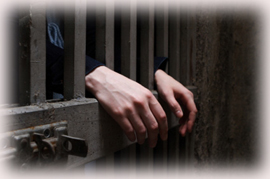Reconciliatory justice for detainees on security-related charges
 Prime Minister Abhisit Vejjajiva’s meeting with two freshly released red-shirt protesters at the parliament on Thursday November 11 was widely seen as critics as a staged photo opportunity to give him a human face.
Prime Minister Abhisit Vejjajiva’s meeting with two freshly released red-shirt protesters at the parliament on Thursday November 11 was widely seen as critics as a staged photo opportunity to give him a human face.
The meeting was done in a hush hush manner in which the two detainees were whisked to the parliament after their release from Klong Prem prison where they had been held for six months. One of the detainees, 32-year old Sommai Inthanaka, told reporters that he was supposed to meet with his sister first but had to meet Mr Abhisit instead. He said he was arrested at Lumpini Park on May 5 and was sentenced to one year imprisonment for defying the emergency decree.
The two were bailed out with the help of the Justice Ministry through a special fund created by the ministry.
Despite the criticism against the prime minister for exploiting the plight of the two red shirts for personal gains, the aided bailout by the Justice Ministry constituted a good gesture although belatedly.
The prime minister has promised to help bail out 40 other red-shirt detainees who were found to be petty offenders and not the agitators.
If the prime minister can deliver as he promised, it will substantially help ease the hardship of the families of the detainees. The move may pave the way for the restoration of reconciliation with some of the red shirts if not most of them.
Five days after the controversial meeting, the Truth and National Reconciliation Commission headed by retired attorney-general Mr Khanit na Nakhon recommended the government on Tuesday to help bail out some of the detained red-shirt protesters who did not commit serious violence during the April-May protests or who were not the real agitators.
There are about 40 plus red-shirt detainees who are regarded as petty offenders who deserve to be bailed out.
The Khanit Commission reasoned that the right to be granted bail is a basic right of accused criminal offender which is internationally recognized and also guaranteed by the Thai Constitution. The temporary release will allow these people to participate in the search for peace and solution to the country’s political conflict, the commission said.
Dr Nirand Pitakwatchara, a member of the National Human Rights Commission and a former senator, said at a recent seminar that he had visited red-shirt detainees in all prisons and found out that several of them were not real trouble-makers and did not take part in violence, such as the torching of provincial halls. They were arrested merely for breaking the emergency decree.
He also pointed out that enforcement of the emergency decree had caused many problems because many of the red-shirt protesters merely joined the protest and were not involved in the violence but some of them get caught and jailed for defying the emergency rule.
Dr Nirand said that the Truth and National Reconciliation Commission did not recommend the government not to enforce the law but to apply discretion on certain cases and to open an opportunity for a dialogue with people who share different political opinions. He described this process as reconciliatory justice which put emphasis on bettering understanding rather than taking revenge.
The human rights commissioner also suggested this process be applied to detainees on security-related charges in the far South.
Government’s help for these “innocent” red-shirt detainees may come a bit too late. But it is nevertheless better than never. However from now on, help to bail out the detainees must speed up which means additional budget is needed to beef up the bail fund of the Justice Ministry.
As suggested by Dr Nirand, similar help must be extended to some 500 “innocent” detainees in the far South who were detained on security-related charges but could not afford the bail simply because they were too poor. Since October, only 14 of them have been released on bail thanks to the help of the Justice Ministry. But the help is just a drop in the ocean and the government needs to do more and more quickly if it really wants to win the hearts and minds of the families of the detainees if not most of the Muslim people in the strife-torn region.
